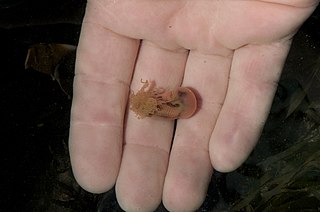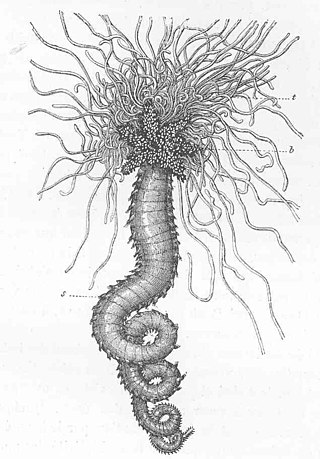
Nereis is a genus of polychaete worms in the family Nereididae. It comprises many species, most of which are marine. Nereis possess setae and parapodia for locomotion and gas exchange. They may have two types of setae, which are found on the parapodia. Acicular setae provide support. Locomotor setae are for crawling, and are the bristles that are visible on the exterior of the Polychaeta. They are cylindrical in shape, found not only in sandy areas, and they are adapted to burrow. They often cling to seagrass (posidonia) or other grass on rocks and sometimes gather in large groups.

The Terebellidae is a marine family of polychaete worms, of which the type taxon is Terebella, described by Carl Linnaeus in his 1767 12th edition of Systema Naturae.

The Serpulidae are a family of sessile, tube-building annelid worms in the class Polychaeta. The members of this family differ from other sabellid tube worms in that they have a specialized operculum that blocks the entrance of their tubes when they withdraw into the tubes. In addition, serpulids secrete tubes of calcium carbonate. Serpulids are the most important biomineralizers among annelids. About 300 species in the family Serpulidae are known, all but one of which live in saline waters. The earliest serpulids are known from the Permian, and possibly the upper Permian south China

Nephtys is a genus of marine catworms. Some species are halotolerant to a degree in that they can survive in estuaries and estuarine lagoons down to a salinity of 20 psu.

Pectinaria is a genus of sand tube-building annelid fanworms in the family Pectinariidae.

Eunice is a genus in the polychaete family Eunicidae. Individuals grow to a length of between 0.5 and 300 cm. Their bodies have multiple segments. They have two eyes and five tentacles. They have well-developed sense organs and relatively large brains. Their color is dark purple-brown to red-brown with a white ring at the fourth segment. They are found in oceans and seas around the world. They have an evertible proboscis with distinctive mouthparts, some of which comprise two rows of maxilliary plates in a radula-like fashion.
Pettais a genus in the polychaetefamily Pectinariidae.

Terebellides is a genus of polychaete worms in the family Trichobranchidae.

Eulalia is a genus of polychaete worms.
Aulophorus is a genus of Naididae.
Aglaophamus is a genus of free-burrowing nephtyid worms.
Amphitrite is a genus of polychaetes belonging to the family Terebellidae. The genus has cosmopolitan distribution.
Marphysa is a genus of annelids belonging to the family Eunicidae.

Thelepus is a genus of polychaetes belonging to the family Terebellidae.
Vermiliopsis is a genus of polychaetes belonging to the family Serpulidae.

Neoamphitrite is a genus of polychaetes belonging to the family Terebellidae.

Odontosyllis is a genus of annelids belonging to the family Syllidae.

Loimia is a genus of annelids belonging to the family Terebellidae.
Hauchiella is a genus of annelids belonging to the family Terebellidae.












